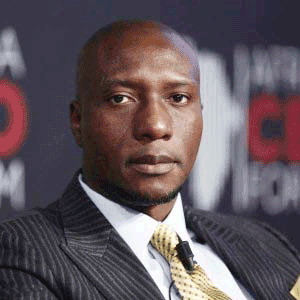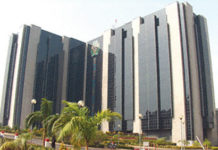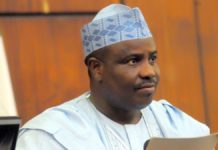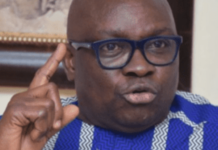•NSE names Omatek, Evans Medical, others as delinquent filers
For flouting post-listing obligation, Oando will cough out N6.2 million to the Nigerian Stock Exchange (NSE) as penalty.

The NSE was economical with details of the sanction when it said it had sanctioned Oando in accordance with applicable Rules of The Exchange.
However, it was learnt that the petroleum marketing company was specifically fined to the tune of N6.2 million, a development likely to put further strain on its financials.
Distraught Oando shareholders have accused NSE of regulatory slackness, saying that the regulator did not do enough to protect investors.
Amaechi Egbo, an equities speculator and shareholder of many companies, including Oando, said it was quite regrettable NSE failed to compel Oando to issue profit warning before declaring its scandalous results.
NSE had admitted having several engagements with Oando both before and after the due dates for filing its financial results and had invited Oando’s audit committee as well as its external auditors.
The Exchange added that it directed that Oando’s top management should discuss the delay in filing with the dealing clerks on the trading floor on October 23.
“With the series of engagements NSE claimed to have had with Oando over delay in releasing their result, it cannot deny having foreknowledge of the losses,” said Egbo.
NSE Secretary and Legal Adviser, Tinu Awe, said the NSE had several engagements with Oando but did not have any idea about its significantly bad financial results.
She added that the NSE had to put Oando on X-Compliance List, implying that it was below listing standards.
Awe, who spoke on a local television programme, said for three consecutive years, the company has to state in its financial results that it was fined for failure to release its audited result timely.
Awe disclosed that one of the lessons from Oando default is that “we (NSE) have to be more open about our regulatory activities. It will be a fine balance to let investors know what regulatory initiatives are,” particularly in matters like default filings.”
She said gap analysis of operational standards in other jurisdictions revealed that companies that are in default issue press releases stating the reasons why they are in default, and the anticipated time to release the result.
Two measures taken against Oando, she said, were tagging it below listing standards, and an undisclosed amount of fine.
“Delisting is final option but it is a very critical decision, and has to be taken at the highest level of governance at the NSE.
“Delisting implies taken the company out of NSE regulatory ambience. Then investors will have opportunity to deal with the company without protection that the market provides.”
On October 23, Oando released its long-awaited results for the full-year ending 2014, with a historic after tax loss of N183.9 billion compared with a profit after tax of N1.396 billion in 2013.
Also in its half-year unaudited results for 2015, the company declared another loss after tax of N35.12 billion from a profit after tax of N8.980 billion in corresponding period in 2014.
Afraid of the future of the company, investors continued to offload their holdings sending shares of the company to the dogs on Wednesday, as it closed at N5 per share from about N8 a week earlier.
A statement issued by NSE last week said “the Exchange is greatly concerned about the delayed filings and the significant losses which were posted for the 2014 fiscal year and the first three quarters of 2015.
“Should the Exchange’s continuing review reveal that Oando committed other infractions, the Exchange will mete out appropriate sanctions pursuant to its Rules. The Exchange has reported the situation to the Securities and Exchange Commission and, will involve other stakeholders, as appropriate.
“Oando made the filings just before the meeting. During the interaction with Dealing Clerks, the CEO of Oando, Wale Tinubu, committed to holding a Facts Behind the Figures (FBF) session on Monday, October 26, 2015 at The Exchange.”
Omatek, Evans Medical, others
Omatek Ventures and Evans Medical are among nine companies named as delinquent audited report and accounts filers in the latest X-Compliance Report of the NSE.
The others are Deap Capital Mgt & Trust, DN Tyre & Rubber, Great Nigeria Insurance, International Energy Insurance, Lennards Nigeria, Premier Breweries, and Costain (WA).
The companies failed to file their audited accounts as far back as 2013.
Omatek Ventures and International Energy Insurance are yet to submit audited financial statements of December 2013; Lennards and Deap Capital have not filed September ending financial statements.
The NSE designed X-Compliance Report to maintain market integrity and protect investors by providing compliance related information on all listed companies.
Companies listed on the NSE are required to adhere to high disclosure standards prescribed in Appendix 111 of the Listing Rules.
Financial information, which is periodic disclosure and ongoing material events disclosure, is expected to be released to the NSE in a timely manner to enable it efficiently maintain an orderly market.
Market analysts said the non-disclosure of latest accounts signals investors’ profit-taking in their share prices, leaving them at par value of 50 kobo per share.
NSE Chief Executive Officer, Oscar Onyema, has explained that strong regulation is critical for the capital market to realise its potential, recalling that entrenching corporate governance was the first step taken in 2011 to transform the Exchange.
“We embedded appropriate governance in all of our dealings from the National Council to its committees, all the way down to the day-to-day running of the Exchange.
“We developed, documented, optimised, and automated multiple policies and procedures to achieve operational efficiency. Today we hold ourselves to the same standards we ask of our listed companies,” he said.
Onyema added that the NSE formulated clear and enforceable rules, with a zero tolerance for infractions.
Steps taken to strengthen regulation and boost confidence included the X-Issuer for the electronic submission of information by issuers, and X-Compliance Report, a transparency initiative designed to help maintain market integrity, by providing compliance related updates on all listed companies.
These measures, Onyema said, “are supported by tight enforcement procedures which include inspections, market surveillance, and a vigorous penalty system.”
Conoil bleeds while shareholders watch
Conoil ranked 34th among the companies penalised by the NSE for failure to file 2014 financial statements within regulatory deadline.
For this default, the indigenous petroleum products marketing company coughed out N1.8 million. It had paid N1.4 million in 2013 for default in filing financial accounts.
Conoil is bleeding to death while shareholders watch helplessly.
The shareholders’ indifference is a reminder of the scenario that preceded banking sector distress in 2009 and the subsequent nationalisation in 2010 of three banks whose shareholders watched while the management emptied the institutions.
Conoil has all the signs of a burdened entity set for a crash unless the shareholders do the needful.
Its interim 2015 first quarter and second quarter financial reports, also filed in default, showed high operating expenses just as liabilities spiralled on the backdrop of declining assets value, shareholder funds, and other negative indices.
Its 2014 financial result, recently released to the NSE, reflected revenue decline from N159.537 billion in 2013 to N128.352 billion in 2014.
Total assets appreciated by N4.221 billion or 5.12 per cent in 2014 to N86.593 billion at the end of the year, against N82.372 billion in 2013.
However, gross profit dropped to N13.789 billion in 2014, from N17.038 billion in 2013. Operating income also tumbled to N173.437 million from N2.758 billion.
With a sharp decline in Price Earning (PE) ratio at 8.184 and a weighted ratio of 0.0154, investment in the stock will take years to recoup; as reflected in dividend payment of N1.00 in 2015 against N4.00 per share dividend in 2013.
Profit before tax declined by about 70 per cent to N1.532 billion, from N4.575 billion in 2013; total comprehensive income dipped to N834,421, from N3,070,091 in 2013.
Earnings per share (EPS), which measure profitability of the stock, dropped to 120 kobo in 2014, from 442 in 2013. Retained earnings reduced to N11,924,301 from N13,865,688.
Fixed assets of N5.671 billion in 2013 dropped by N446 million or 7.86 per cent in 2014 to N5.225 billion. Liabilities grew to N70,497,410 in 2014 against N64,334,592 in 2013.
Shareholders’ fund dropped N1.941 billion in value to N16.096 billion at the end of 2014, against N18.037 billion in 2013, a 10.76 per cent decline.
Thus Conoil emerged as the worst underperformer in the Oil & Gas segment of the NSE, as its share price declined 18 per cent to N27.41 from N33.28 per share before September.
There did not seem to be any respite in October as investors continued to react to its half year 2015 (H1:2015) performance which showed year-on-year (Y-o-Y) declines in top-line to 45.19 per cent and bottom-line to 64.48 per cent.
Investors are offloading the stock for fear that returns on investment may be ruined further by poor financial results.
Even as Conoil has bled over the years, shareholders have not mustered the will to probe its declining fortunes.














